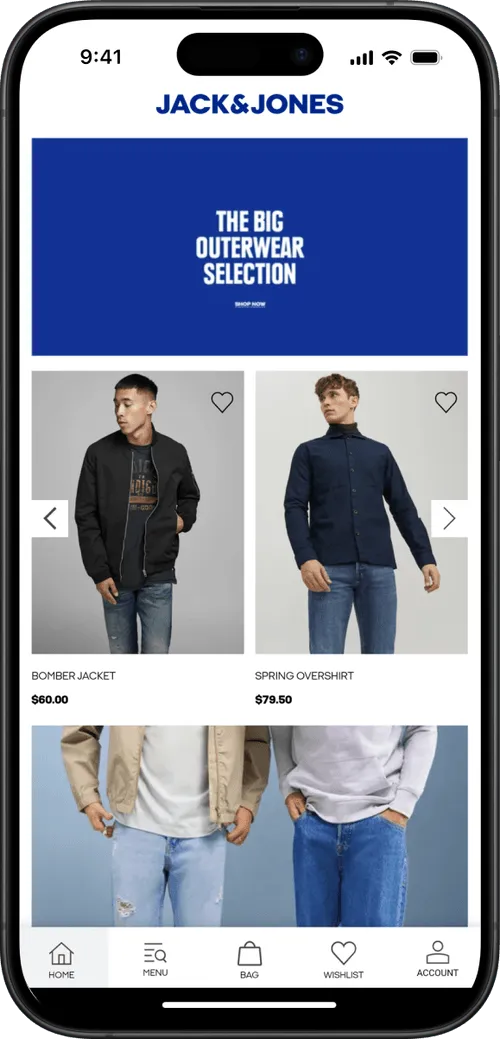5 Reasons Why Your Ecommerce Website Needs a Mobile App
Retailers have had a complicated digital journey from brick-and-mortar stores to websites, and many are wondering, is it time to move to apps?
Merchants have had to embrace the digital revolution, creating websites that act as their shop window, draw in more customers, and boost sales. But with research showing that 79% of smartphone users made a purchase using their mobile device in 2021, now might be the time to create an app for every eCommerce store.
There are pros and cons to this consideration. On the one hand, mobile retail traffic overtook desktop traffic a long time ago. On the other hand, there’s the argument that a mobile-optimized website is enough.
In this article, we’ll be taking a thorough look at both sides of the debate, helping you decide whether or not to launch an app for your eCommerce store - and if so, what your app should look like.
Resources
Remember back in 2008 when there were less than 500 apps? Today, there are millions, which suggests creating an app might be a tad cheaper than it used to be.
Unfortunately, it’s impossible to reasonably determine exactly how much your app might cost, as the figure will depend on numerous factors, including the number of features. Marketing is an important cost to factor in as well, and we’d suggest that you look at a ballpark figure of anywhere between $1,000 and $50,000.
Can you afford this? Do you have the adequate resources within your marketing budget to allocate a chunk of it towards raising awareness of your app? Consider maintenance too, and the expenses that come with making sure your app works.
Another thing to consider is whether to create an app in-house or outsource it. If you go at it alone, you’re essentially operating on a very small budget, and the only fees you’ll need to pay are the developer licenses.
On the other hand, if you’re lacking the time and people, and have a fair amount of room in your budget, you might want to outsource your app development.
Traffic and audience
Another important consideration is traffic and reach. While we’ve already seen that more and more traffic is coming from mobile searches, you need to dive deeper into your analytics to see exactly what devices people are using to access your site, as this will give you a clearer idea whether to stick to a mobile website or upgrade to an app.
In other words, will you drive more desirable traffic via an app than you would via a mobile website?
Websites support multiple devices and, in theory, can reach a broader audience than an app. So, if most of your traffic is coming from mobile searches but you don’t have the resources to create an app, you could just create a mobile-optimized website instead (although you should have done this already). This is perfect for landing new sales.
Apps require a built-in fan base in many instances. People need to know to go and search for your app on an app store, not just in Google. They’ll likely need to already have an account to make purchasing simple. This puts the app emphasis on existing, returning shoppers who you don’t need SEO to drive back to your store.
If you go down this route, it’s vital that your website is 100% mobile-friendly. This means:
- Responsively designed
- Don’t use Flash
- Correct spacing between menus and buttons
- Enlarged font for easy reading
- Simple navigation
- Static content
Competition
Now is the time to take a look at your competition to see if they have an app or not. And if they do, what is their app like? What does it look like? What can a customer do on the app that they can’t do on the mobile version of the site? Is it successful?
Being slow to adapt to market trends means you’ll get left behind - and you may even go out of business.
However, if your rivals have apps that aren’t successful, you could still get away with optimizing your store for mobile use by taking a closer look at your competitors to see if you can spot any weaknesses.
For example, perhaps they haven’t added a live chat to their website, or maybe it loads slowly, or is hard to navigate. Maybe they haven’t considered touchscreens enough, so there isn’t enough space between links or the buttons are too small.
If, on the other hand, your competitors have beautifully designed websites that are fully optimized for mobile devices, it might be time to create an app that sets you apart.
Customers
Lastly - what do your customers want?
Data has shown that 57% of customers prefer using a mobile app over a mobile-optimized website, which alone suggests it’s time for you to create an app. Not just that, but in 2021 people spent 90% of their mobile time using apps.
However, this isn’t a good enough reason to create an app, provided you already have a fully-optimized mobile website that’s clearly performing well in terms of traffic and conversions.
That said, you should still take a look at the customers and see if there are any pain points that a mobile app could solve. For instance, would a gamified app boost conversions even more? Would push notifications within your app increase daily interactions and improve engagement?
If there are no pain points that an app can resolve, perhaps you don’t need one. On the flip side, would an easy-to-use app remove barriers to conversions and increase customer lifetime value?
Do your customers want an app? Create polls and ask for feedback.
Benefits of a Mobile App
If you’re still undecided about whether or not now is the right time to launch an app for your eCommerce store, the next two sections will explore the benefits and possible disadvantages.
- User retention. You can build an in-app loyalty program that rewards your customers for repeat purchases, thereby improving your average customer lifetime value.
- Better customer service. You can add an in-app chatbot to your app that answers your customer queries in real-time. Not just that, but if your customers experience a problem with your app, they can let you know, and you can solve it ASAP.
- Connect with your customers in real-time. Whenever you launch a new product or you’re running a discount, you can let your customers straight away via push notifications.
- Create a competitive edge. If your competitors don’t have an app yet, that doesn’t mean you don’t need one. In fact, you could launch a mobile app to give yourself a competitive edge.
It’s also not that difficult to convert a mobile website into an app provided your website is already performing well and looks good.
Disadvantages of a Mobile App
- It might be no better than your website. A mobile-optimized website will already be taking up a lot of your effort, time, and resources. Is creating an app really worth it?
- More marketing. Along with taking the time to plan, build and launch your app, you’ll also need to market it. Do you have the time and budget for that?
- Extra maintenance work. Apps break down. They have bugs that need fixing. They need to be updated. Unless you’re prepared to take on this extra maintenance work, sticking with a mobile website might be a safer option.
What an eCommerce Mobile App Should Look Like
If you’re beginning to think that you should launch an app for your eCommerce store, let’s now take a look at some of the features your app needs.

Fast Checkout
Your customers want to be able to check out quickly and easily. You can add single-click payments to your app to speed up the crucial last stage before a sale. If that’s not always possible, you can add an autocomplete function so that customers don’t have to keep filling in the same form each time they want to make a purchase.
You should also consider adding a progress indicator that lets your customers know how far along they are in the checkout process.
Pro tip: Consider partnering up with a 3PL to ensure there are never any delays during the shipping stage.
Push Notifications
Push notifications are essential because you can use them to update your customers straight away whenever you’re launching a new product, offering a discount, free shipping, and so on. This improves user engagement in the app, and it can increase sales.
You can also personalize your push notifications: overall, they’re a non-invasive way of connecting with and engaging your customers.
Returns
Your customers use apps because they let them carry out tasks with the touch of a few buttons - such as requesting and processing a return. As well as having a clear returns policy in your app (which goes a long way to building trust and confidence in your brand), make sure that customers are able to process returns.
Consistent Branding
Your app needs to reflect your online store so that when a customer logs in for the first time, it feels familiar to them and they recognize your brand.
You should also employ strong App Store optimization strategies to ensure your app gets seen and downloaded.
Conclusion
There’s little doubt that mobile commerce is strong, and that any brand that ignores this fact will lose out in the long run. Shoppers are making purchases on their mobile devices and the number of people who download apps is going to grow.
Now is the time to start seriously thinking about your mobile app, and how you’ll manage your marketing budget to raise awareness.
Be clever with your app. You can use your app to provide unique features that set your brand apart from the competition, carefully place your CTAs for more conversions, use push notifications in a timely manner for extra engagement, and personalize your updates to each customer.
Don’t overlook the value of in-app analytics as well. These will help you learn more about your customers and their wants, needs, and pain points.
How to get your app built at a fraction of the time and cost
Don’t get left behind in a world where convenience, accessibility, and instant gratification are key to success. Building a native app from scratch might be too expensive for a small brand, and also very inefficient when you already have a site and CMS to maintain.
Thankfully solutions like the MobiLoud platform make app development affordable for small businesses.
Whether your ecommerce site runs on WooCommerce, Shopify or any other platform, our MobiLoud solution will be the best fit to easily build an ecommerce mobile app by converting your existing website to an app.
Our MobiLoud platform and service allows you to get all the benefits of a native mobile app without the cost.
By leveraging a platform built to serve hundreds of site owners like you, you get to build a native ecommerce app fast and at a fraction of the cost, with the added advantage of having your mobile app syncing with your website, so no work is needed to maintain it.
Want to learn more? Get started with a free preview of your app, or schedule a free, personalized demo and get a first-hand look at the platform's possibilities with one of our app experts.
FAQs
Convert your website into a mobile app











